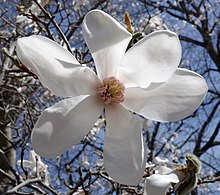Magnolia salicifolia, also known as willow-leafed magnolia or anise magnolia, originates from Japan. It is a small deciduous tree 7.5 m (25 ft) tall, with narrow lanceolate leaves with whitened undersides. The leaves are not as narrow as true willows (Salix), but is narrow compared to other magnolias, giving this tree a finer texture. The 10 cm-wide scented flowers emerge in early spring before the leaves.[1] Flowers have six petals.[1] The leaves and bark are fragrant when crushed. It grows in rocky, granite soil along stream banks.[2]
| Magnolia salicifolia | |
|---|---|

| |
| Magnolia salicifolia Arnold Arboretum of Harvard University accession #1004-61*A | |
| Scientific classification | |
| Kingdom: | Plantae |
| Clade: | Tracheophytes |
| Clade: | Angiosperms |
| Clade: | Magnoliids |
| Order: | Magnoliales |
| Family: | Magnoliaceae |
| Genus: | Magnolia |
| Subgenus: | Magnolia subg. Yulania |
| Section: | Magnolia sect. Yulania |
| Subsection: | Magnolia subsect. Yulania |
| Species: | M. salicifolia
|
| Binomial name | |
| Magnolia salicifolia | |
The cultivar 'Wada's Memory', with double white scented flowers, has gained the Royal Horticultural Society's Award of Garden Merit.[3]
Gallery
edit-
Magnolia salicifolia
-
Flower detail
-
Magnolia salicifolia, Arnold Arboretum of Harvard University, accession #51-63*A.
-
Immature fruit
References
edit- ^ a b "Magnolia salicifolia | Landscape Plants | Oregon State University". landscapeplants.oregonstate.edu. Retrieved 2023-05-24.
- ^ Dirr, Michael A.; Warren, Keith S. (2019). The Tree Book: Superior Selections for Landscapes, Streetscapes, and Gardens. Timber Press. ISBN 9781604697148.
- ^ "Magnolia salicifolia 'Wada's Memory'". Royal Horticultural Society. 2017. Retrieved 2017-01-27.
External links
edit- Magnolia salicifolia images at the Arnold Arboretum of Harvard University Plant Image Database
- Gapinski, Andrew. "Magnolia salicifolia 'Grape Expectation'." Arnold Arboretum of Harvard University website, 16 April 2014. Accessed 21 April 2020.
- "Magnolia salicifolia 'Wada's Memory' by Arborway Gate, Spring 2018." Library Featured Images, Arnold Arboretum of Harvard University website, 23 April 2018. Accessed 21 April 2020.
- Photo of flowers